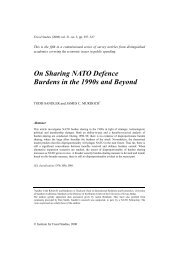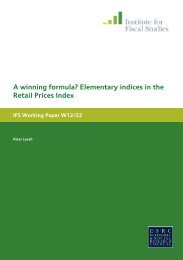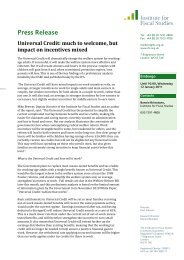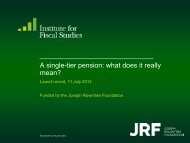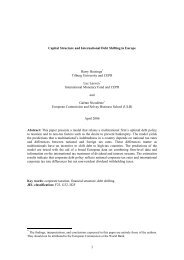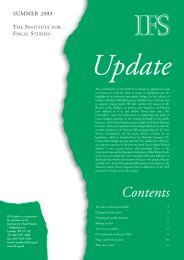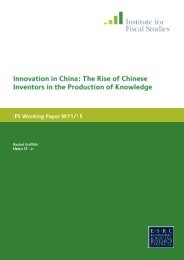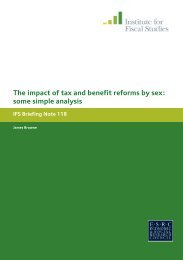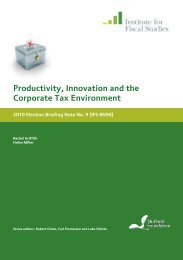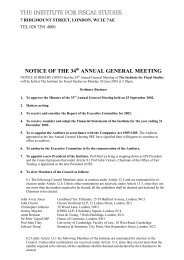A single-tier pension: what does it really mean? - The Institute For ...
A single-tier pension: what does it really mean? - The Institute For ...
A single-tier pension: what does it really mean? - The Institute For ...
You also want an ePaper? Increase the reach of your titles
YUMPU automatically turns print PDFs into web optimized ePapers that Google loves.
Long-run effect on <strong>pension</strong>er incomes<br />
Box 5.1 provides further illustration by describing the state <strong>pension</strong> accrual that<br />
three example individuals would receive under the current and proposed<br />
systems.<br />
Box 5.1. Examples of state <strong>pension</strong> accrual under the current and <strong>single</strong><strong>tier</strong><br />
systems<br />
<strong>The</strong> following examples describe hypothetical individuals born in 1986. All<br />
monetary figures are expressed in 2013–14 earnings terms.<br />
Randall is employed and earns at the UEL every year between the ages of 20<br />
and 54 (inclusive); he is not a member of a private <strong>pension</strong> scheme. Under<br />
current legislation, he will accrue state <strong>pension</strong> rights worth £186.30 per week<br />
at the SPA, which he will receive from the age of 68. This comprises £109.00 per<br />
week of BSP ent<strong>it</strong>lement and £77.30 of S2P ent<strong>it</strong>lement. Under the proposed<br />
<strong>single</strong>-<strong>tier</strong> <strong>pension</strong> system, he would accrue a state <strong>pension</strong> worth £146.30 per<br />
week.<br />
Jeff is employed for 10 years and earns at the LEL between the ages of 20 and<br />
29 but then suffers an accident at work and is unable to work again due to ill<br />
health. He then receives the lim<strong>it</strong>ed capac<strong>it</strong>y for work component of universal<br />
cred<strong>it</strong> until he is 55. Under current legislation, he will accrue state <strong>pension</strong> rights<br />
worth £166.50 per week at the SPA, which he will receive from the age of 68.<br />
This comprises £109.00 of BSP ent<strong>it</strong>lement and £57.50 of S2P ent<strong>it</strong>lement.<br />
Under the proposed <strong>single</strong>-<strong>tier</strong> <strong>pension</strong> system, he would accrue a state <strong>pension</strong><br />
worth £146.30 per week.<br />
James is self-employed for 45 years between the ages of 20 and 64 (inclusive).<br />
Under current legislation, he will accrue state <strong>pension</strong> rights worth £109.00 per<br />
week at the SPA, which he will receive from the age of 68. This comprises simply<br />
a full BSP, as he <strong>does</strong> not accrue any ent<strong>it</strong>lement to S2P. Under the proposed<br />
<strong>single</strong>-<strong>tier</strong> <strong>pension</strong> system, he would accrue a state <strong>pension</strong> worth £146.30 per<br />
week.<br />
Zach has 30 years of moderate earnings. Under the current system, he will<br />
accrue a state <strong>pension</strong> of £156.80 per week at SPA, made up of a full BSP<br />
(£109.00) and £47.80 of S2P. Under the proposed <strong>single</strong>-<strong>tier</strong> <strong>pension</strong> system, he<br />
would accrue a state <strong>pension</strong> worth £125.40 per week.<br />
5.2 How would state <strong>pension</strong> income evolve through<br />
retirement under the two systems?<br />
As shown in the previous section, the amount of state <strong>pension</strong> income received at<br />
SPA would unambiguously be lower under the proposed system than under the<br />
current rules for the major<strong>it</strong>y of individuals in later cohorts, based on the<br />
indicative figures provided in the Wh<strong>it</strong>e Paper for the level of the <strong>single</strong>-<strong>tier</strong><br />
<strong>pension</strong>. (<strong>The</strong> main exception to this is the self-employed, and any others who do<br />
activ<strong>it</strong>ies that only earn BSP ent<strong>it</strong>lement; these groups are discussed in Section<br />
5.3.) However, the <strong>single</strong>-<strong>tier</strong> <strong>pension</strong> is set to be indexed more generously<br />
51



